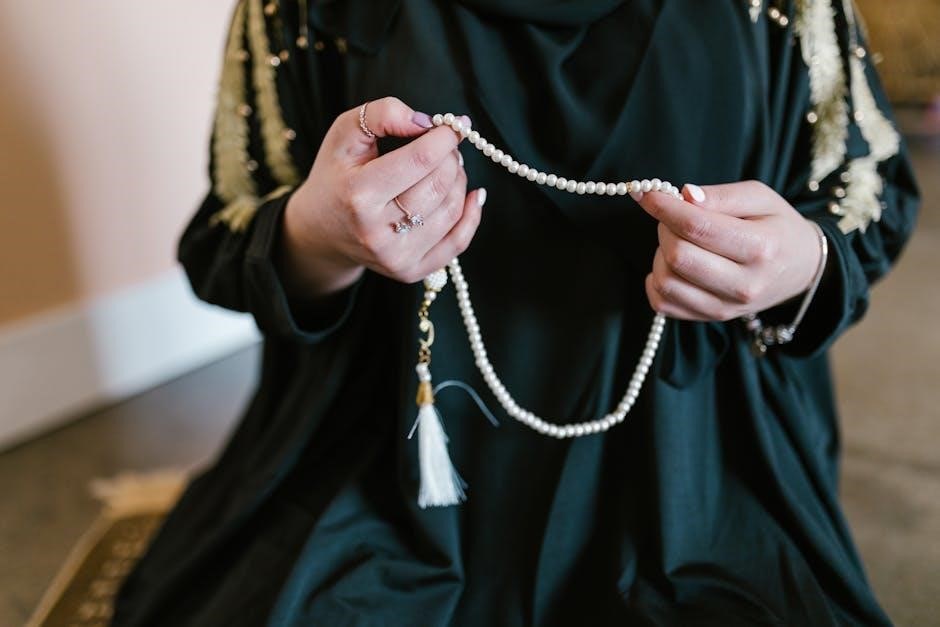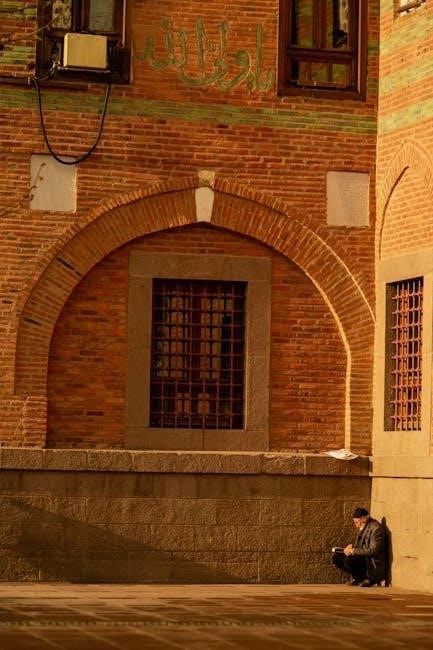Kunuth Dua is a significant Islamic supplication, often recited during Isha prayer’s Witr, seeking divine guidance and forgiveness. Downloadable Kunuth Dua PDF resources are widely available for easy learning and memorization.
Definition and Significance
Kunuth Dua, also known as Dua Qunoot, is a profound Islamic supplication rooted in the Arabic term “Qanata,” meaning submission to Allah. It is a heartfelt plea for divine guidance, forgiveness, and protection, recited during the Witr prayer in Isha. This dua holds significant spiritual value, emphasizing a believer’s reliance on Allah and seeking His mercy in times of ease or hardship. Its recitation fosters a deep connection with the Almighty, reflecting humility and trust. Kunuth Dua is not just a prayer but a meaningful act of worship that strengthens faith and provides solace. Its memorization and recitation are highly encouraged, with Kunuth Dua PDF resources widely available for learning and practice.
Historical Context and Origins

Kunuth Dua, or Dua Qunoot, traces its origins to the early days of Islam, when Prophet Muhammad (SAW) introduced it as a supplication during times of hardship. It was first practiced in Makkah during a period of calamity, reflecting the Prophet’s reliance on divine assistance. The practice became a Sunnah, particularly during the Witr prayer, and is rooted in the Arabic term “Qanata,” meaning submission to Allah. Over time, it evolved into two forms: Qunut Nazilah for calamities and Qunut Rotibah for regular recitation. This dua is deeply embedded in Islamic tradition, with references in Hadiths, such as the narration by Ubayy bin Kab, highlighting its historical and spiritual significance.

Understanding the Kunuth Dua
Kunuth Dua is a Sunnah practice, offering believers a universal means to seek divine guidance, protection, and forgiveness in various life circumstances.
Arabic Text and Transliteration
The Arabic text of Kunuth Dua is a sacred supplication, often recited during the Witr prayer. Its transliteration helps non-Arabic speakers recite it accurately. For example: Allahummah dini feeman hadayt, wa aafini feeman aafayt. This translates to seeking divine guidance and protection. PDF resources provide the complete Arabic script and transliteration, aiding memorization and proper recitation. These resources are widely available online, ensuring accessibility for all Muslims. The transliteration is especially beneficial for those unfamiliar with Arabic, enabling them to connect with the supplication’s profound meaning.
English Translation and Meaning
The English translation of Kunuth Dua reveals its profound spiritual significance, serving as a heartfelt plea for divine assistance and forgiveness. It begins with, “O Allah, guide me among those You have guided,” emphasizing the seeker’s reliance on Allah’s wisdom. The supplication continues with requests for security, divine favor, and protection from harm. Its meaning encapsulates themes of humility, trust, and gratitude, reflecting a deep connection with Allah. The translation also highlights the believer’s acknowledgment of Allah’s sovereignty and mercy. Kunuth Dua PDF resources often include both the Arabic text and its English translation, making it accessible for all to understand and recite meaningfully. This supplication is a powerful tool for spiritual growth and seeking divine intervention in times of need.
Key Themes and Spiritual Benefits
Kunuth Dua revolves around themes of humility, trust in Allah, and seeking divine forgiveness. It emphasizes the believer’s dependence on Allah’s guidance and mercy, fostering a deeper spiritual connection. Reciting this supplication cultivates gratitude for Allah’s blessings and protection, while also seeking refuge from harm. The spiritual benefits include heightened self-reflection, increased faith, and a sense of peace in times of adversity. By humbling oneself before Allah, the reciter experiences emotional and spiritual upliftment. Kunuth Dua PDF resources often highlight these themes, making it easier for believers to understand and embody its profound meanings in their daily lives. Regular recitation strengthens one’s relationship with Allah and provides comfort in challenging circumstances.

Types of Kunuth Dua
Kunuth Dua includes Qunut Nazilah (for calamities) and Qunut Rotibah (regular). Qunut Nazilah seeks divine aid in crises, while Qunut Rotibah is recited during Subuh and Witr prayers.
Qunut Nazilah (Supplication for Calamities)
Qunut Nazilah is a specific supplication recited during times of crises or calamities, seeking divine intervention and relief. Performed in times of war or oppression, it emphasizes calling upon Allah for protection and victory. This dua is rooted in Islamic tradition, as Prophet Muhammad (SAW) first practiced it during hardships in Makkah. Qunut Nazilah is distinct from regular Qunut, focusing on urgent needs and divine assistance. It is often recited in congregation, fostering unity among believers. Downloadable Kunuth Dua PDF resources include this supplication, guiding believers on its proper recitation and meaning. This practice strengthens faith and reliance on Allah during challenging circumstances.
Qunut Rotibah (Regular Supplication)
Qunut Rotibah is a regular supplication in Islamic prayer, performed as part of the Sunnah. It is typically recited during the Subuh (Fajr) prayer and the Witr prayer, especially in the second half of Ramadan. This supplication emphasizes seeking divine guidance, forgiveness, and protection. Qunut Rotibah is a steadfast part of Islamic worship, fostering a constant spiritual connection with Allah. Its structure includes praising Allah, seeking His mercy, and expressing gratitude. Downloadable Kunuth Dua PDF resources provide detailed Arabic text, transliteration, and translations, aiding believers in learning and memorizing this supplication. It is a beautiful way to maintain a consistent dialogue with the Almighty, reflecting trust and reliance on His will.
Differences and Applications
Qunut Nazilah and Qunut Rotibah are two distinct forms of Kunuth Dua, each serving unique purposes. Qunut Nazilah is specifically recited during times of calamities or hardships, seeking Allah’s immediate help and relief. In contrast, Qunut Rotibah is a regular supplication, often performed during Subuh and Witr prayers, emphasizing ongoing spiritual growth and divine protection. While Qunut Nazilah is situational, Qunut Rotibah is a consistent part of worship, fostering a continuous connection with Allah. Both supplications highlight the adaptability of Kunuth Dua in addressing diverse spiritual and practical needs, making them invaluable in a Muslim’s daily and extraordinary prayers. Their differences lie in context, but their purpose is unified in seeking divine mercy and guidance.

How to Recite Kunuth Dua
Kunuth Dua is typically recited during the Witr prayer, particularly in the third rakat. Raise your hands, tie them, and supplicate, seeking divine guidance and forgiveness.
Step-by-Step Guide
To recite Kunuth Dua, begin by performing the Witr prayer. In the third rakat, after reciting Surah Fatiha and an additional Surah, raise your hands to your ears and say “Allahu Akbar.” Lower your hands, place your right hand over your left, and recite the Kunuth Dua with focus. Ensure your heart is present, seeking divine guidance and forgiveness. Maintain proper posture, avoiding distractions, and recite the supplication clearly. Conclude by tying your hands again and completing the prayer. This method ensures a meaningful and spiritually enriching experience. Kunuth Dua PDF guides are available for easy reference and memorization.
Recommended Times for Recitation

The Kunuth Dua is primarily recited during the Witr prayer, specifically in the third rakat of the Isha prayer. It is also recommended to recite it during the Subuh prayer and in the second half of Ramadan. Additionally, it is prescribed during times of calamity or hardship, as it serves as a supplication for divine assistance and relief. Reciting it consistently fosters a deeper connection with Allah and strengthens one’s faith. For those seeking guidance, downloadable Kunuth Dua PDF resources provide clear instructions and translations, making it easier to incorporate this practice into daily worship. Regular recitation is encouraged to seek comfort and divine refuge.

Physical and Spiritual Etiquettes
The Kunuth Dua should be recited with utmost sincerity and focus. Physically, one must face the Kaaba, raise their hands to the ears, and ensure cleanliness and proper attire. Spiritually, it is essential to maintain khushu (devotion) and humility. The supplicant should tie their hands after raising them and avoid distractions. Reciting with a clear voice and deliberate pace enhances the spiritual experience. It is recommended to recite during times of calmness and reflection, ensuring the heart is fully engaged. These etiquettes elevate the act of supplication, making it more acceptable and meaningful. Proper adherence to these guidelines fosters a deeper connection with Allah.

Kunuth Dua in Islamic Scriptures
The Quran and Hadiths emphasize the significance of supplication, with Kunuth Dua referenced in various verses and prophetic traditions. Kunuth Dua PDF resources highlight its scriptural roots.
References in the Quran
The Quran underscores the importance of supplication, with verses like وَقَالَ رَبُّكُمُ ٱدْعُونِىٓ أَسْتَجِبْ لَكُمْ (And your Lord says, “Call upon Me; I will respond to you”) emphasizing divine response to prayers. While the term “Kunuth Dua” isn’t explicitly mentioned, its essence aligns with Quranic teachings on seeking guidance and mercy. Verses such as وَإِذَا سَألَك عِبَادِي عَنِّي highlight Allah’s closeness to His servants. These references form the theological foundation for practices like Kunuth Dua, encouraging believers to turn to Allah in all circumstances; Kunuth Dua PDF resources often include reflections on these verses, providing deeper insights into their relevance to the supplication.
Hadiths and Prophetic Traditions
The practice of Kunuth Dua is rooted in Prophetic traditions, with narrations highlighting its significance. A Hadith by Ubayy bin Kab mentions the Prophet (SAW) reciting Qunoot during Witr, emphasizing its role in seeking divine help. Another tradition by Abdullah ibn Mubarak underscores the supplication’s essence, aligning it with Islamic prayer practices. These narrations provide a spiritual foundation for Kunuth Dua, encouraging believers to seek Allah’s mercy and guidance. Modern resources, such as downloadable Kunuth Dua PDF guides, often include these traditions to inspire and educate Muslims in their worship. They serve as a bridge between ancient teachings and contemporary practice, ensuring the supplication’s timeless relevance.
Interpretations by Islamic Scholars
Islamic scholars have deeply analyzed Kunuth Dua, emphasizing its profound spiritual and emotional significance. Dr. Tahir, for instance, has elaborated on the five requests in Dua Qunoot, highlighting their wisdom and relevance to believers’ lives. Similarly, scholars like Imam Bukhari and Abdullah ibn Mubarak have provided insights into the supplication’s structure and its alignment with Prophetic teachings. These interpretations often accompany Kunuth Dua PDF resources, such as those by Mashari Rashid Al-Afasy, offering believers a deeper understanding of the supplication’s meaning and application. Their explanations enrich the practice, making it more accessible and meaningful for Muslims seeking divine guidance and mercy.

Practical Applications of Kunuth Dua
Kunuth Dua is practically applied for seeking divine guidance, protection, and forgiveness, especially during hardships, and to express gratitude and trust in Allah’s mercy.
Seeking Guidance and Forgiveness
Kunuth Dua is a powerful supplication for seeking Allah’s guidance and forgiveness. It emphasizes trust in Allah’s wisdom and mercy, especially during challenging times. By reciting Kunuth Dua, believers humbly ask for divine direction, forgiveness for past mistakes, and strength to adhere to righteous paths. This supplication is particularly beneficial for those seeking spiritual clarity and emotional solace. It fosters a deep connection with Allah, reinforcing faith and reliance on His providence. Regular recitation helps cultivate humility and gratitude, essential for spiritual growth. Kunuth Dua serves as a heartfelt plea for Allah’s grace, making it a vital practice for seeking His guidance and mercy.
Protection and Divine Assistance
Kunuth Dua is a potent supplication seeking Allah’s protection and divine assistance, especially in times of hardship or uncertainty. Reciting Kunuth Dua serves as a shield against harm, offering believers refuge from adversity. It is a heartfelt plea for Allah’s safeguarding grace, invoking His mercy to ward off calamities and evil. By reciting this dua, Muslims express their dependence on Allah’s providence, seeking strength to navigate life’s challenges. Kunuth Dua also reinforces trust in Allah’s wisdom, providing solace and reassurance. Its verses emphasize divine protection, making it a vital prayer for those seeking safety and assistance in their daily lives and spiritual journeys. This supplication is a powerful means to draw closer to Allah’s grace and security.
Gratitude and Praise
Kunuth Dua is a profound expression of gratitude and praise to Allah, acknowledging His boundless blessings and mercy. It serves as a heartfelt acknowledgment of Allah’s grace, emphasizing the believer’s humility and appreciation. Through this supplication, Muslims praise Allah for His guidance, forgiveness, and sustenance, recognizing His divine providence in all aspects of life. The dua also highlights the importance of being thankful for both visible and hidden blessings, fostering a deeper connection with the Almighty. By incorporating gratitude, Kunuth Dua strengthens faith and reinforces the believer’s commitment to worship and obedience. It is a beautiful blend of devotion and thanksgiving, reflecting the Islamic ethos of humility and praise.

Kunuth Dua in Modern Practice
Kunuth Dua remains a vital practice in modern Islamic life, with PDF resources widely available for easy access and memorization. Its relevance endures, fostering spiritual growth and connection.
Contemporary Relevance
Kunuth Dua remains a cornerstone of modern Islamic practice, offering solace and guidance in today’s fast-paced world. Its timeless message of humility and trust in Allah resonates deeply, making it a vital tool for spiritual growth. The availability of Kunuth Dua PDF resources has simplified access, enabling Muslims worldwide to learn and recite it with ease. This supplication not only addresses personal struggles but also fosters a sense of community, as it is often recited collectively during congregational prayers. By integrating Kunuth Dua into daily life, believers can navigate modern challenges with faith and resilience, drawing strength from its profound spiritual benefits. Its relevance endures, bridging tradition and contemporary life seamlessly.
Downloadable Resources (PDF)
The Kunuth Dua PDF is a valuable resource for Muslims seeking to learn and recite this supplication with precision. Available online, these PDF guides include the Arabic text, transliteration, and English translation, making it accessible to learners of all levels. Many websites, such as saintil.com and Maktabah Publications, offer free downloads of Kunuth Dua PDF materials. These resources often feature the famous qunoot by Mashari Rashid Al-Afasy, complete with clear Arabic script and step-by-step transliterations to aid memorization. Additionally, some PDFs include interpretations and spiritual insights, enhancing understanding and fostering a deeper connection to the supplication. Downloading these resources is a practical way to incorporate Kunuth Dua into daily worship and spiritual growth.
Community and Congregational Practices
The recitation of Kunuth Dua is often practiced collectively in mosques and Islamic centers, fostering a sense of unity and solidarity among worshippers. During times of crisis or hardship, congregations may come together to perform Qunut Nazilah, seeking divine relief and protection. This communal practice strengthens spiritual bonds and provides emotional support to those facing challenges. Many mosques include Kunuth Dua in their Friday sermons or special prayers, encouraging participation and shared devotion. Such collective efforts not only enhance the impact of the supplication but also reinforce the importance of togetherness in seeking Allah’s mercy and guidance.
Kunuth Dua is a profound supplication, offering spiritual guidance and divine connection. Its regular practice fosters humility and reliance on Allah, enriching one’s faith journey.
Final Thoughts on Kunuth Dua
Kunuth Dua is a powerful supplication that strengthens one’s connection with Allah, seeking guidance, forgiveness, and divine assistance. Its recitation, especially during Witr, embodies humility and trust in Allah’s will. As highlighted in Kunuth Dua PDF resources, it serves as a timeless prayer for all situations, offering comfort and solace. By understanding its significance and practicing it regularly, believers can deepen their spiritual growth. Whether recited individually or in congregation, Kunuth Dua remains a cherished practice, reflecting the essence of Islamic worship and devotion. Its enduring relevance ensures it continues to inspire Muslims globally, fostering a deeper bond with the Almighty.
Encouragement for Regular Practice
Regularly reciting Kunuth Dua fosters a deep connection with Allah, offering solace and strength in times of need. Consistency in practice ensures spiritual growth and humility, as it reinforces reliance on divine guidance. Kunuth Dua PDF resources provide easy access to accurate texts and transliterations, making it simpler to incorporate this beautiful supplication into daily prayers. By prioritizing this practice, believers can cultivate gratitude, seek forgiveness, and remain steadfast in their faith. Embrace Kunuth Dua as a lifelong habit, allowing its profound meanings to transform your spiritual journey and draw closer to Allah’s mercy and blessings.
